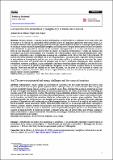Por favor, use este identificador para citar o enlazar a este item:
http://hdl.handle.net/10261/267570COMPARTIR / EXPORTAR:
 SHARE SHARE
 CORE
BASE CORE
BASE
|
|
| Visualizar otros formatos: MARC | Dublin Core | RDF | ORE | MODS | METS | DIDL | DATACITE | |

| Título: | Los nuevos retos ambientales y energéticos y la transición ecosocial |
Otros títulos: | The new environmental and energy challenges and the ecosocial transition | Autor: | García-Olivares, Antonio CSIC ORCID ; López, Roger Carles | Palabras clave: | Postcapitalism Green New Deal Degrowth Social change Postcapitalismo Decrecimiento Cambio social |
Fecha de publicación: | jul-2021 | Editor: | Ediciones Complutense | Citación: | Politica y Sociedad 58(2): e 64877 (2021) | Resumen: | [EN] Anthropogenic climate change, the destruction of ecosystems, the increasing extraction of resources, and the zenith of fossil fuels can place global capitalism before challenges never seen in a few decades. When energy and material availability change, human societies are enabled to move from strategies that maximize production per unit of time to strategies that optimize efficiency, but the institutional lock-in and cultural frameworks are weakening the reaction capacity of contemporary societies. The growing social mobilization in favor of an ecosocial transition should try to break lock-in, and demand an ecosystem regeneration that makes societies more resilient. In the political debate on the transition, we identify four narratives, labeled as: techno-optimist economism, green capitalism, Green New Deal and degrowth. The article discusses the strengths and weaknesses of the last three positions. The more collapsing positions of degrowth are self-condemning to political marginalization, for absence of an explicit and realistic plan for the transition. On the other hand, a future Green New Deal could serve as an umbrella under which convergences between scientists, workers, activists and politicians could develop, which would mobilize the transformative forces and facilitate the creation of niches or nucleation centers of potentially disruptive practices in a foreseeable future scenario of limited growth. It would also provoke a division in the elites of power, with a part of them seeking an alliance with workers, scientists and activists. These factors, according to Goldstone, favor the success of mobilizations that seek important social changes [ES] El cambio climático antropogénico, la destrucción de ecosistemas, la creciente extracción de recursos, y el cénit de los combustibles fósiles, pueden colocar al capitalismo global ante retos nunca vistos en pocas décadas. Las sociedades humanas están capacitadas para pasar de estrategias maximizadoras de potencia a estrategias optimizadoras de eficiencia cuando cambia la disponibilidad energética y material, pero el bloqueo institucional y los marcos culturales están debilitando la capacidad de reacción de las sociedades contemporáneas. La creciente movilización social en favor de una transición ecosocial debería tratar de romper los bloqueos institucionales y exigir una regeneración ecosistémica que vuelva más resilientes a las sociedades. En el debate político sobre la transición identificamos cuatro narrativas, etiquetables como: tecnooptimismo economicista, capitalismo verde, Green New Deal y decrecimiento. El artículo discute las fortalezas y debilidades de las tres últimas posturas. Las posturas más colapsistas del decrecimiento se auto-condenan a la marginación política, por carecer de un plan explícito y realista para la transición. Por contra, un futuro Green New Deal podría servir de paraguas bajo el cual se desarrollen convergencias entre científicos, trabajadores, activistas y políticos, lo cual movilizaría a las fuerzas transformadoras y facilitaría la creación de nichos o centros de nucleación de prácticas potencialmente disruptoras en un previsible escenario futuro de crecimiento limitado. Provocaría también una división en las élites del poder, con una parte de ellas buscando la alianza con trabajadores, científicos y activistas. Estos factores, según Goldstone, favorecen el éxito de las movilizaciones que buscan cambios sociales importantes |
Descripción: | Special issue Nuevas articulaciones de la extrema derecha global: actores, discursos, prácticas, identidades y los retos de la democracia .-- 13 pages, 1 figure | Versión del editor: | https://doi.org/10.5209/POSO.64877 | URI: | http://hdl.handle.net/10261/267570 | DOI: | 10.5209/POSO.64877 | Identificadores: | e-issn: 1988-3129 |
| Aparece en las colecciones: | (ICM) Artículos |
Ficheros en este ítem:
| Fichero | Descripción | Tamaño | Formato | |
|---|---|---|---|---|
| Garcia¡_Olivares_et_al_2021.pdf | 485,59 kB | Adobe PDF |  Visualizar/Abrir |
CORE Recommender
SCOPUSTM
Citations
1
checked on 03-abr-2024
WEB OF SCIENCETM
Citations
1
checked on 24-feb-2024
Page view(s)
152
checked on 03-may-2024
Download(s)
100
checked on 03-may-2024
Google ScholarTM
Check
Altmetric
Altmetric
Este item está licenciado bajo una Licencia Creative Commons

